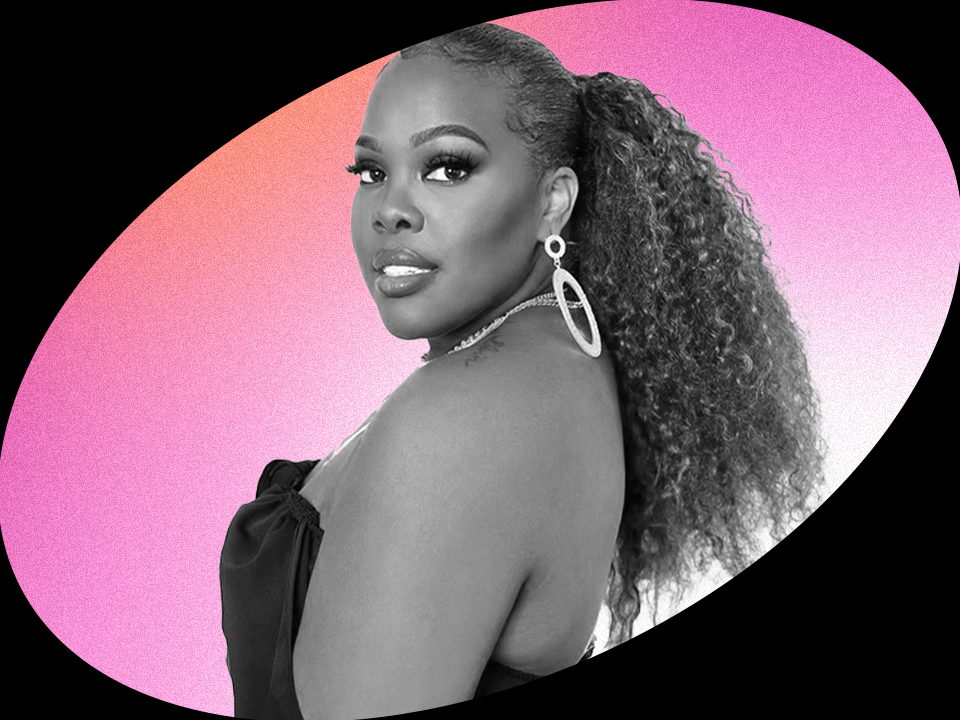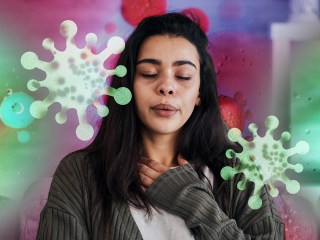Amber Riley Is Practicing Her Joy
"You can't save everybody, so make sure you save yourself."
After years of laying the groundwork for a long-lasting career and prioritizing her mental health, Amber Riley is ready to really enjoy life. And that includes being hard at work on her next EP following 2020’s RILEY and picking up a psychology degree along the way. After a summer well spent appreciating all the love in her life, Riley talks to Wondermind about self-esteem, how medication helped her make space for happiness, and her message for Black women.
[Sign up here to never miss these candid conversations delivered straight to your inbox.]
WM: How are you doing lately?
Amber Riley: I'm doing really well lately. I was just talking to my mom about how proud I am about how I have been taking care of my mental health and the growth that I've seen in the past year, so I'm doing really good.
WM: You’re also going through some changes, having recently ended an engagement on mutual terms. How are you feeling after that chapter?
AR: I feel really great. I took the summer to be with myself and have so much fun. I've never been the outside girl, and this summer, I was the outside girl. I loved that for me. I have to reign it in now because she's back to being the working girl, but I really did take the time this summer to work on myself and enjoy being with myself and having fun with my friends and receiving love. Romantic love isn’t the only kind of love in the world. You have love from your friends; you have love from your family; I have love from fans; I get love from strangers. Appreciating all of that this summer and taking it all in has been so freaking dope.
WM: What aspect of your mental health would you describe as a work in progress?
AR: Self-esteem is an ongoing battle for me. That's the one part of my mental health that I have to stay on top of because we do live in this social media world. [And] because I am an actor, a lot of what I get judged for is very superficial and can make you judge yourself. I have to stay on top of affirming myself constantly and reminding myself who I am. I have good days and days where it's a little bit harder to convince myself of the truth.
WM: What helps you find validation within yourself rather than focusing on what other people think?
AR: I had a spiritual upbringing that really helped, even though there's so much religious and church trauma that we could probably go on and talk about for hours. I still have to say that church and all of that was a firm foundation for me and helped me know God in a way that helped me know myself. Constantly being in that church environment taught you to search within. I feel like I've taken that practice outside of church and outside of religion [and use it] to always be introspective.
WM: In church, we’re taught to pray through everything, but I know you also started therapy when you were struggling with your mental health. What encouraged you to seek that extra help?
AR: Honestly, the praying helped, but it wasn't hitting [laughs]. Not like that, but it wasn't enough. I'm a logical person also, so [going to therapy and] talking to someone who can explain to me what was happening in my body [helped.] When I struggled with depression and anxiety, I had physical reactions to what was happening in my mind. So being able to sit and talk to someone who can explain to me what was happening helped me get on that journey. At that point, I was desperate. I was like, “I'll try anything. Reiki. You want to go hiking? I'm going to try whatever's gonna help.” My best friend is a mental health professional and life coach, and he encouraged me to go to therapy. I [also] had so many friends around me that spoke really well of therapy. I wasn't used to opening up and telling people my business and being vulnerable, but I knew I needed to do something different, and it's literally saved my life.
WM: What's one of the biggest lessons that you've learned through your sessions?
AR: One thing that I've learned about the process of finding a therapist is it may not be the first person that you talk to. You might have to go a couple of times to find the person that you connect with, that speaks your language, that you feel is absolutely there for you. It did take a while for me to find a therapist. The main thing I learned in therapy is you have to do the work. They help you put things in perspective, and it's you finding the solution—it's not somebody telling you what to do and how to live your life. It's them using their expertise and what they went to school for to help you figure it out, so the work is yours.
WM: You’ve also shared that you take medication for your mental health. What helped you get past that stigma?
AR: I let my mental health deteriorate to a point where I needed that extra help. I definitely was one of those people who was like, “I ain't taking no crazy pills. What you're talking about? That stuff is going to make you high.” I was definitely that girl, and it's such a huge stigma in our community. In the Black community, in general, we don't trust the medical industry at all anyway. So taking something where they're telling you it's going to mess with your brain, and you think you're going to be a zombie or something, I get it. I was on that wave.
But getting to that point of desperation and needing it [pushed me to speak] to a psychiatrist and have them explain to me what the medication was. I don't believe in taking medication without being in therapy and speaking to a psychiatrist, which is a doctor of medicine, but that support system did help me.
WM: One depression symptom you experienced was feeling empty and not interested in anything. What helped get you interested and excited about life again?
AR: It definitely took a long time to find that. Medication opened up some room in my mind for me to think and feel. My brain was so clouded with negative thoughts and negative feelings, so it opened up some room in my mind. I also had to learn to sit in my feelings; I had to be OK with not being OK until I was OK. I had to trust the process. I don't like the term “faking it until you make it,” I like saying I practiced my joy. I practiced my happiness, even if I didn't feel like it. I woke up at 9 a.m. every day and got my ass in bed by 10 p.m. I started moving like I was well before I actually felt well. Eventually, my body, mind, and spirit all got the message and came together, but it took time.
WM: What's a mental health goal you’re working toward right now?
AR: Mental health is so important to me, and it's an ongoing journey. I want to do more things in the mental health space—I've started going back to get my degree in psychology. I’m going back to school, but of course, that's going to [take] a long time because I start working, and I'm like, Uhhh, school? I would love to eventually write a book or journal about my journey. Whatever it is that I can do to specifically help our community and specifically Black women, I'm all in.
WM: What message would you like to leave with the Black women who are reading this?
AR: Put the cape down, girl. Worry about yourself; this world is not worried about us. We have to support ourselves and support one another. The only ones who know what we're going through at this point is us. That doesn't mean that we don't have others around us that can help, but they are few and far between sometimes. You can't save everybody, so make sure you save yourself.
This interview has been edited and condensed for length and clarity.
Wondermind does not provide medical advice, diagnosis, or treatment. Any information published on this website or by this brand is not intended as a replacement for medical advice. Always consult a qualified health or mental health professional with any questions or concerns about your mental health.




